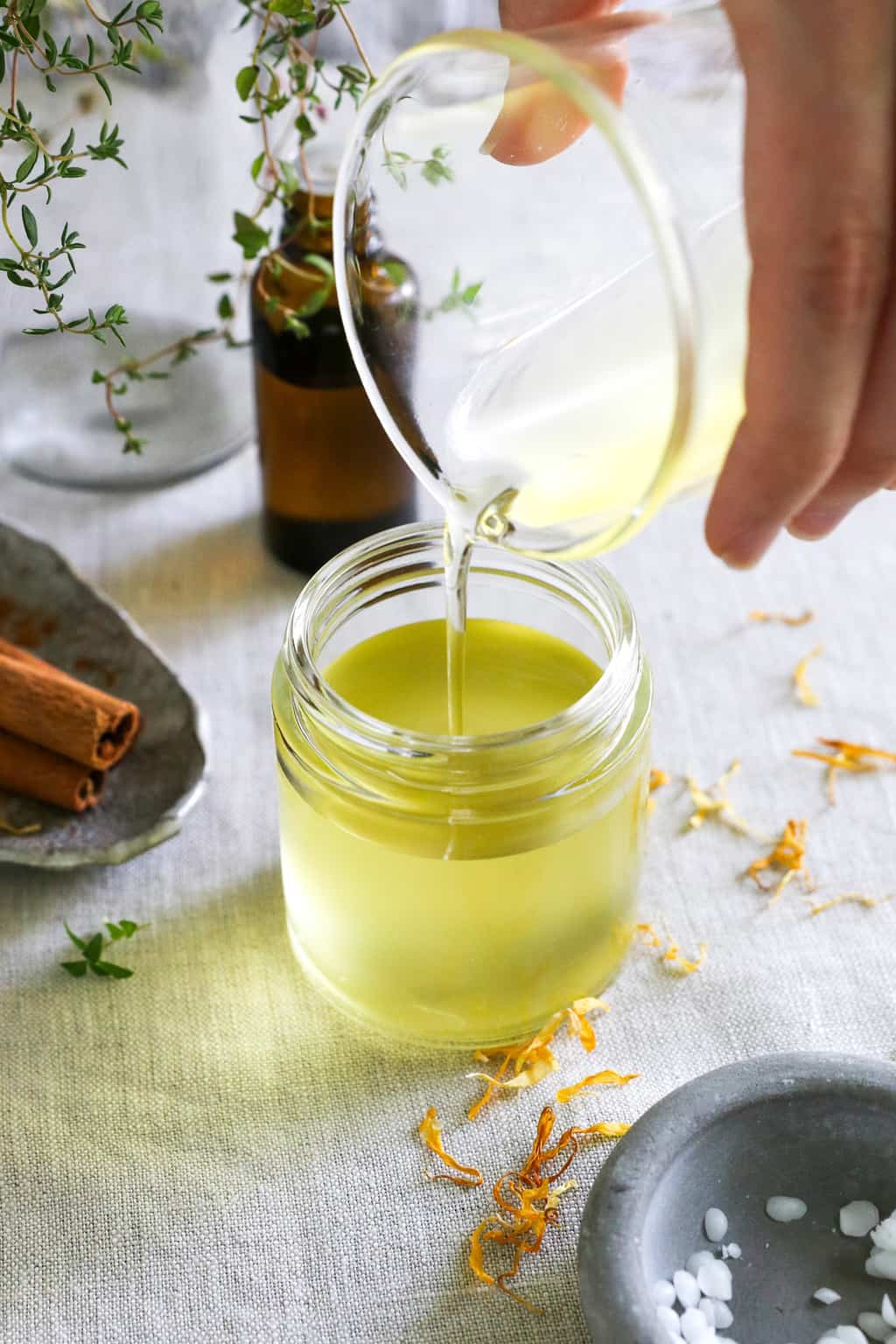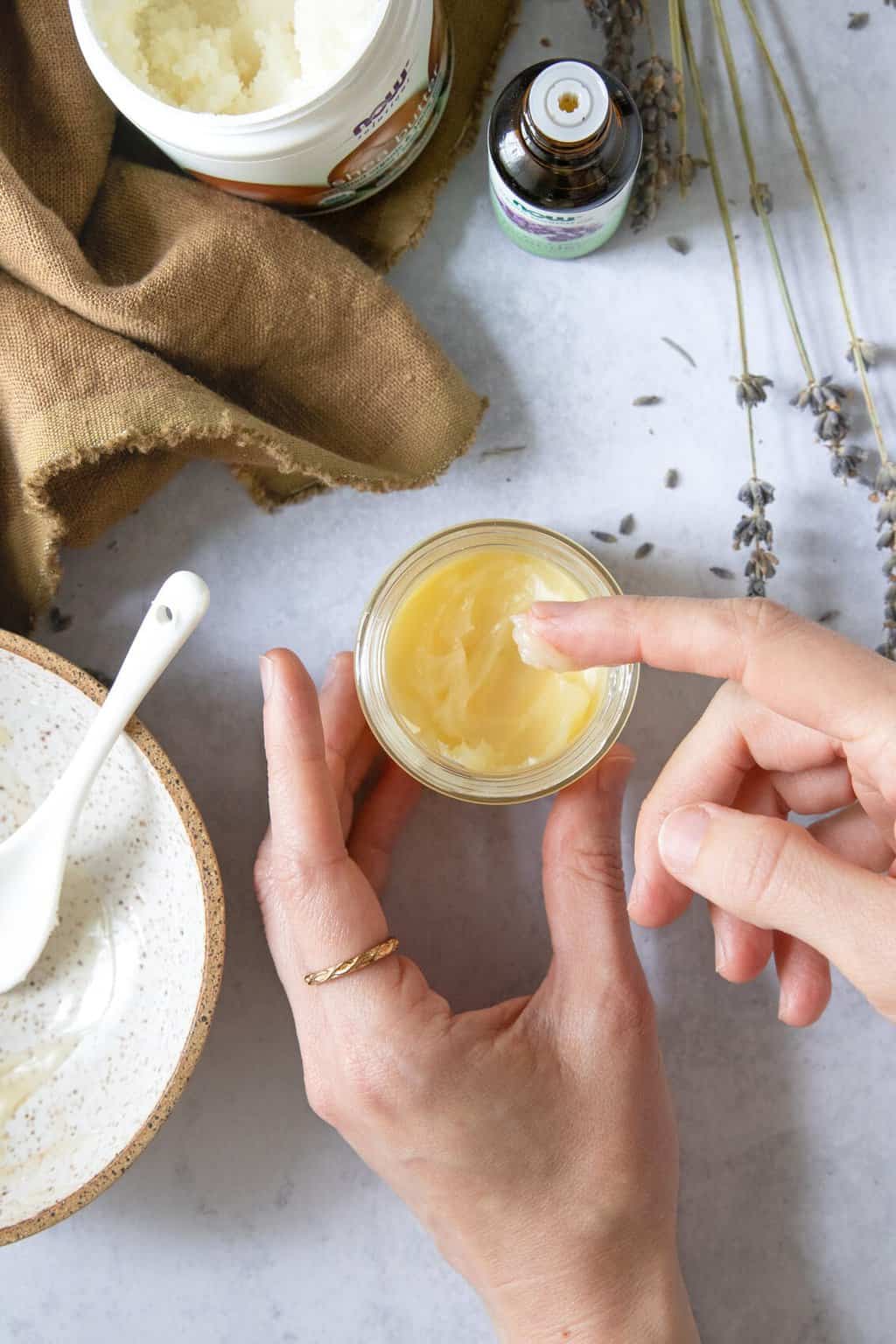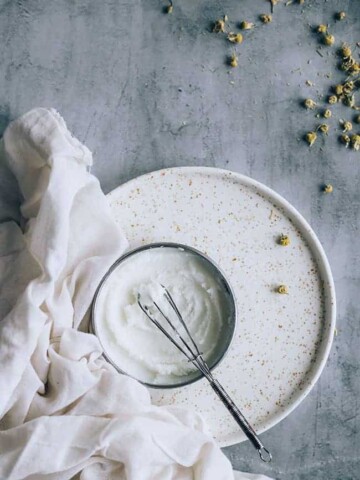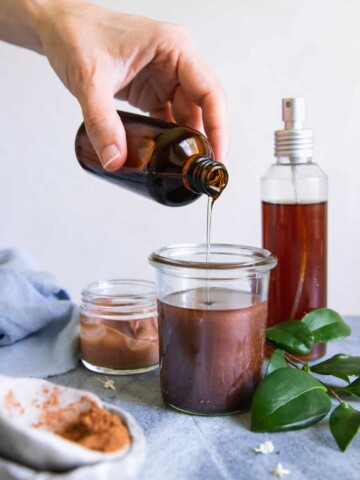Let me introduce you to my new secret weapon: coconut oil!
I know, I know—am I the last person to discover just how amazing this stuff really is?
While coconut oil is most commonly considered a cooking oil, consisting of the fat pressed from the coconut, it’s also long been hailed for its moisturizing benefits for the skin and hair. I’ve just recently started using it for my super dry skin, and I can’t say enough good things. It feels heavenly, and the light coconut scent makes me feel like I’m hanging out at a tropical beach.
It’s particularly beneficial for pregnant women. I have been religiously rubbing it over my ever-growing belly to prevent stretch marks (and help the old ones). At 30 weeks pregnant, I can say for sure that using coconut oil for stretch marks is effective! It also helps relieve some of that itching as the skin stretches.
Jump to:
- Coconut Oil Beauty Benefits
- 1. It can help reduce stretch marks
- 2. It locks in moisture
- 3. It treats inflamed skin
- 4. It's an antioxidant
- 5. It rejuvenates hair
- Beauty Uses for Coconut Oil
- 1. Whipped Body Lotion
- 2. Softening Detox Bath
- 3. Shaving Cream
- 4. Conditioning Hair Mask
- 5. Body Scrub
- 6. Lip Scrub + Lip Gloss
- 7. Cuticle Oil
- 8. Makeup Remover
- 9. Massage Oil
- 10. Toothpaste
- 11. Deodorant
- 12. Hand Sanitizer
- 13. Face Mask
Coconut Oil Beauty Benefits
Meet the Experts
Nadir Qazi, D.O., cosmetic dermatology surgeon with Qazi Cosmetic Clinic in Irvine, California
Medically reviewed by Dr. Rina Mary Allawh, M.D., a board-certified dermatologist
1. It can help reduce stretch marks
Several factors are at play when it comes to what causes stretch marks, including genetics as well as the basic expansion of skin while undergoing stress, which triggers the release of hormones like cortisol, explains Nadir Qazi, D.O., cosmetic dermatology surgeon with Qazi Cosmetic Clinic in Irvine, California. "While there haven’t been any conclusive studies on coconut oil’s effect on stretch marks, it has the potential to visibly reduce their appearance," he says. "In addition, it is considered a natural anti-inflammatory and may help to stimulate collagen production in the skin."
Rub coconut oil onto your belly (or legs or whatever) to reduce and prevent stretch marks. As mentioned, it also helps cut back on itching—which can be a pesky pregnancy side effect!
2. It locks in moisture
Coconut oil is occlusive, acting as a barrier between the skin and the air, Dr. Qazi explains. As a result, it traps any moisture on the skin, keeping the skin hydrated and preventing any transdermal water loss that may occur while using the oil. "Coconut oil is also an emollient, so it softens skin in addition to trapping moisture, adding an additional feeling of soft, hydrated skin," he adds.
Therefore, you can use coconut oil as a stand-alone moisturizer (it’s all-natural, too), or you can add it to your existing moisturizer for a boost of hydration. It works effectively on all types of skin, including super dry skin like mine. It may even help delay wrinkles and skin sagging, thanks to its potential for firming effects.
3. It treats inflamed skin
Coconut oil has long been used as an all-natural treatment for chronic skin conditions such as psoriasis, dermatitis, and eczema. It has been shown in studies to improve the skin barrier function in inflammatory skin disease [source]. Apply a small dab on the affected area once or twice daily, and you’ll likely see some positive results.
4. It's an antioxidant
Research, including one study published in the peer-reviewed journal Skin Pharmacology and Physiology, has shown that coconut oil can help prevent premature aging and degenerative diseases due to its antioxidant properties [source].
5. It rejuvenates hair
Coconut oil is one of the few natural oils shown in studies to absorb into hair to strengthen and revitalize it from within [source], notes Dr. Qazi. "In addition, coconut oil’s antibacterial and antifungal properties can help maintain hair follicle and scalp health," he says. "However, because coconut oil is occlusive, it is most effective when used as a treatment mask rather than an everyday hair cosmetic to prevent build-up, as it can be difficult to remove."
One of the most effective and healthy methods of removal that Dr. Qazi recommends is to mix pure aloe gel into shampoo, apply it directly to the hair, wait 10 minutes, and then rinse.
Beauty Uses for Coconut Oil
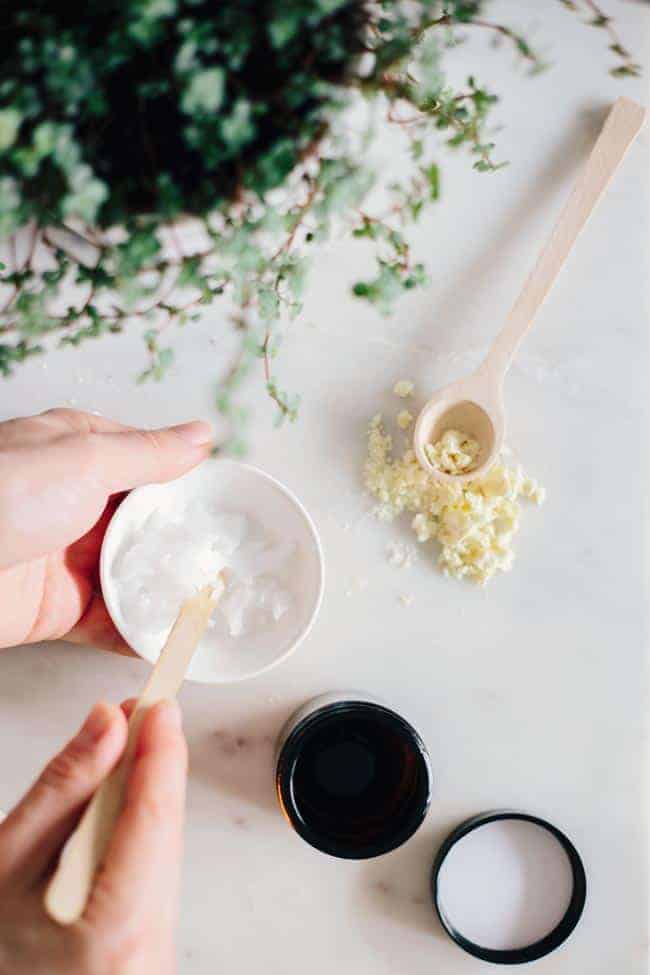
Coconut oil is one of the most versatile natural beauty products. The scent is relaxing like a day at the beach, and the healing properties of coconut oil soothe and repair skin. Its abundant natural fats moisturize, while the lauric acid it contains protects and softens skin. It’s also an antiseptic and helps maintain a healthy pH level in the skin [source].
I find myself dipping into the coconut oil jar for everything from dry hands to curling iron burns. If you’re new to natural beauty, then coconut oil is where I would recommend starting. Get yourself a big jar, and try some of our favorite do-it-yourself beauty uses for coconut oil.
1. Whipped Body Lotion
Slather coconut oil all over your body (including your face—don’t be shy!) right after your shower. It is best absorbed if the skin is still slightly wet. I keep the jar on the bathroom counter so the heat from the shower helps soften and melt the oil.
But, hey, if you forget to slather right after your shower, just apply whenever you remember—you’ll still see some impressive moisturizing benefits.
Okay, yes, you can just dip your hand in the coconut oil jar. But if that’s not appealing, try whipping it. Whipped coconut oil alone or combined with shea butter creates such a luxurious buttery texture. It’s great for improving the tone and texture of skin bummers like stretch marks and scars.
- ½ cup shea butter
- ¼ cup coconut oil
1. Using a double boiler over low heat, melt the shea butter and coconut oil together.
2. Refrigerate the mixture for about an hour to cool.
3. Beat the ingredients with a hand mixer for 5–7 minutes or until the mixture becomes fluffy.
4. Use a rubber spatula to scrape down the sides of the bowl as needed.
5. Transfer the body butter to a glass container with a lid. Should last at least 6 months.
2. Softening Detox Bath
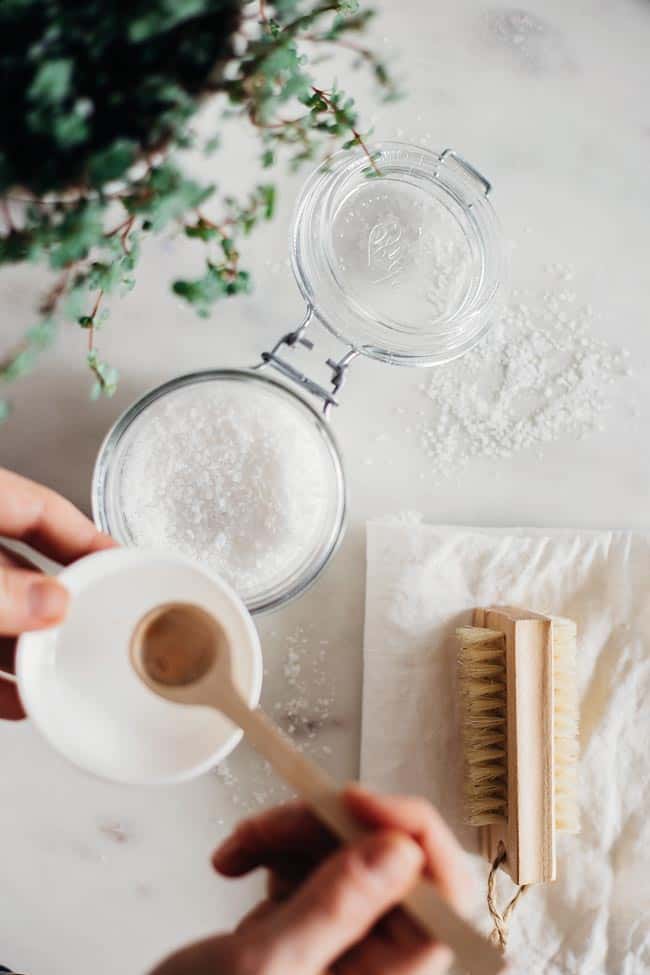
Add a big scoop of coconut oil with about two cups of Epsom salt to create a warm detox bath. It's like using a moisturizing body wash—the oil coats and hydrates your skin. This counters the drying effect of soaking in hot, salty water nicely. You can apply more oil when you get out and go to bed, all warm and moisturized.
3. Shaving Cream
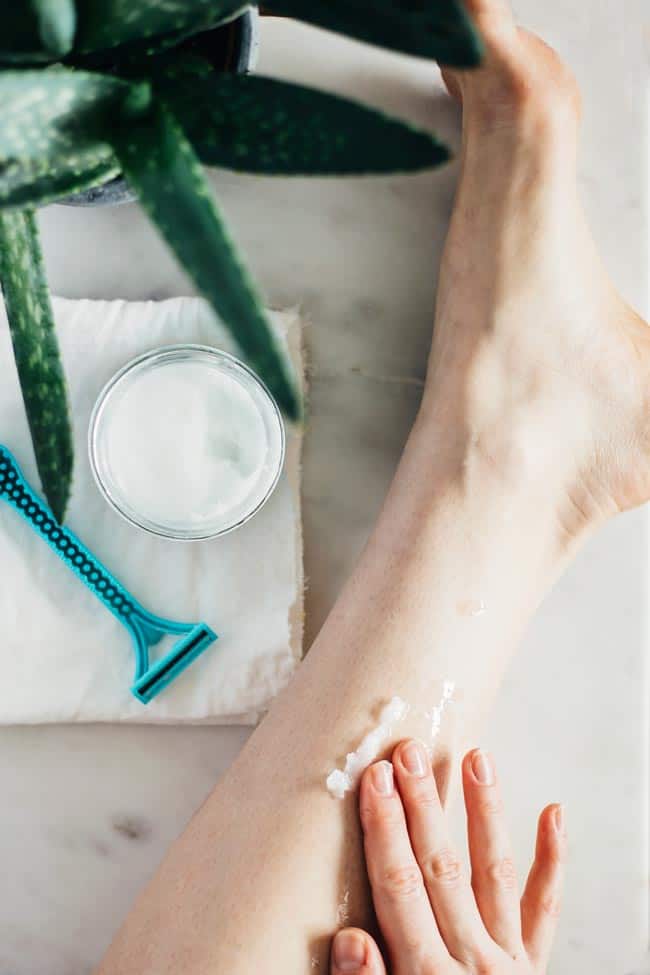
Rub coconut oil (by itself or combined with aloe vera) on your legs in the shower for an antibacterial shaving cream that helps prevent nicks and razor burn. You’ll be shocked at how soft your legs feel—they’ll be moisturized, silky, and gorgeous for days!
4. Conditioning Hair Mask
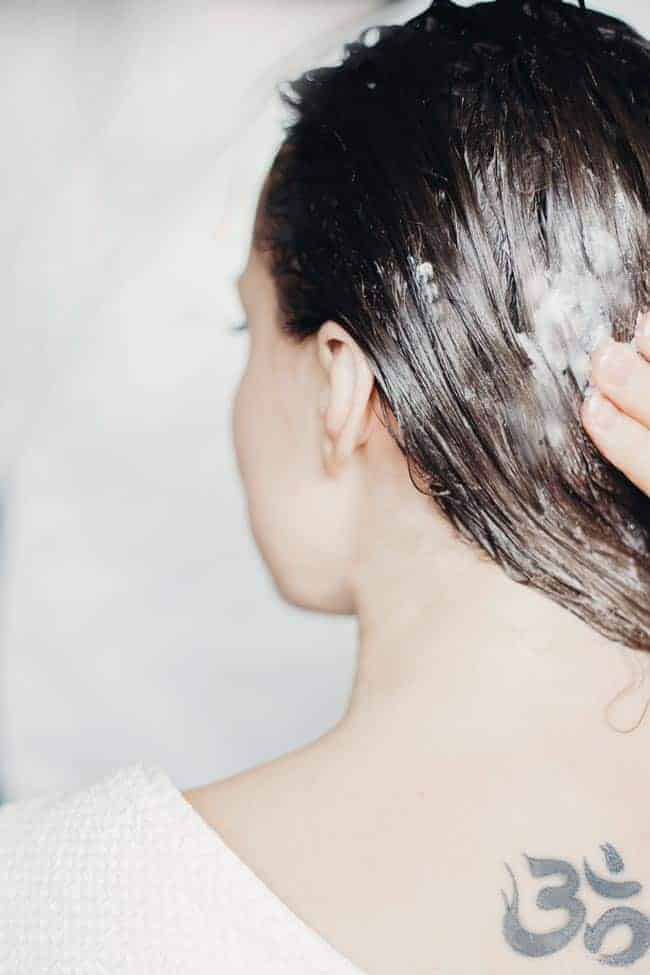
Implementing coconut oil into your normal hair care routine may also be helpful for the treatment of dry, itchy scalp. When using coconut oil for dry scalp, gently massage the oil on the scalp directly (think of it as a scalp medicine rather than for the hair). Typically, we recommend applying a thin layer or pea-sized amount of coconut oil after you shower and resume your normal hair care routine.
To treat dry, frizzy, or brittle hair, start massaging the coconut oil into the hair closer to the ends and away from the roots for a helpful trick to avoid a greasy scalp at bedtime. You can also use coconut oil as a hair mask. In the morning, you will be pleased to wake up to smooth, shiny hair.
Mix 2 tablespoons of coconut oil with 1 tablespoon of honey and heat in the microwave for a few seconds until warm enough to spread easily.
Massage the mixture onto your scalp or rub it into the dry ends of your hair to take down frizz and split ends. Then, cover with a shower cap for 30 minutes to an hour. Rinse and wash hair well, and enjoy gorgeously soft, shiny hair.
5. Body Scrub
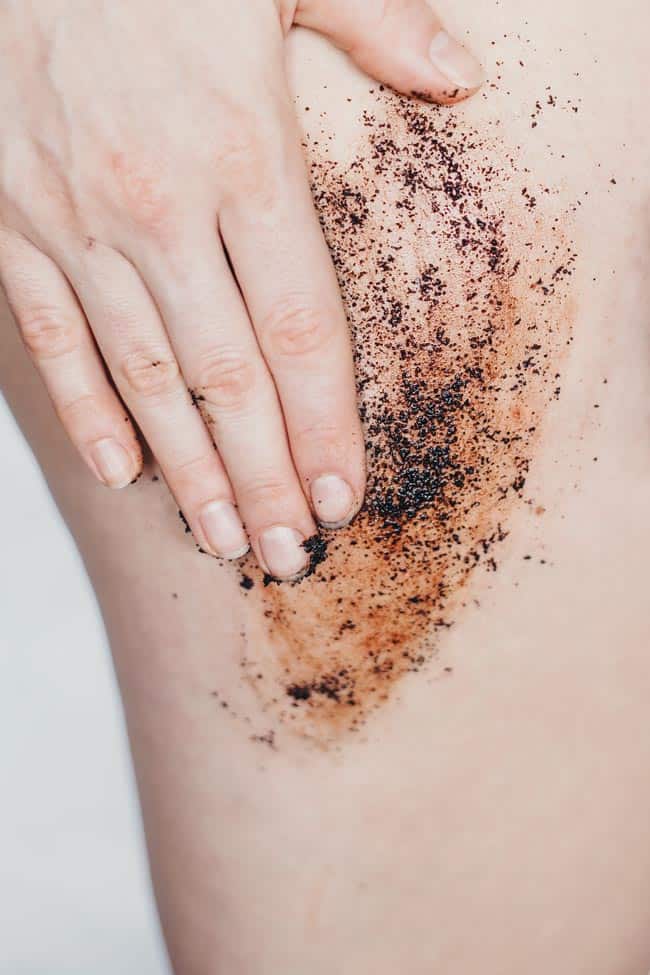
Combine ½ cup coconut oil and ½ cup coffee grounds and firmly massage into your thighs and booty to increase circulation and reduce the appearance of cellulite.
An easy way to always have a scrub on hand? Whip up some Coffee-Coconut Oil Scrub Cubes—one of our most popular beauty DIYs! To enhance the benefits of coconut oil on stretch marks and cellulite, pair it with a dry-brushing routine.
6. Lip Scrub + Lip Gloss
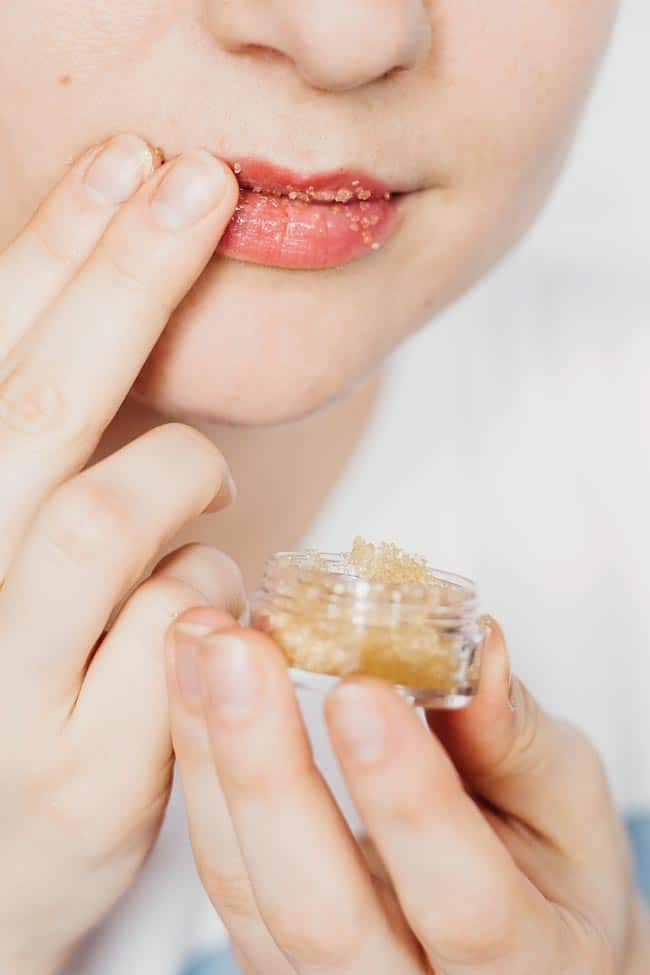
Mix 1 tablespoon of coconut oil with 1 teaspoon of sugar for a quick, easy, and edible lip scrub. Apply a small, dime-sized amount of coconut oil to dry lips for quick shine. Or use coconut oil in a DIY lip balm recipe.
7. Cuticle Oil

Use coconut oil to soften your hands and rough feet. Massage it into nail beds for a simple cuticle cream that also helps improve nail strength. Add a drop or two of essential oil for nails and rub it on your hands for a natural moisturizer that helps reduce fine lines and age spots.
8. Makeup Remover
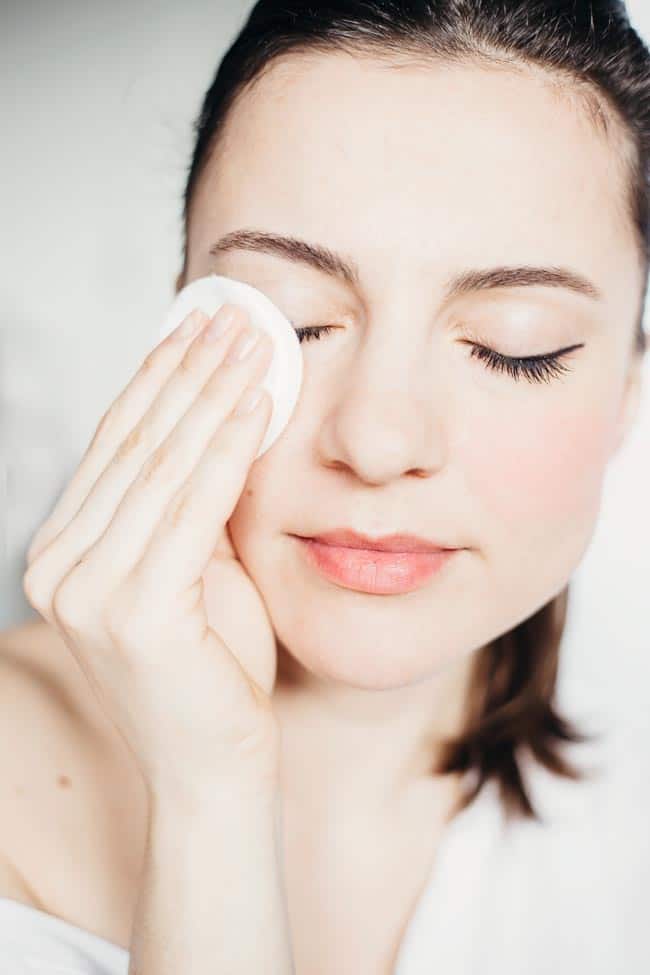
Dab a cotton pad with coconut oil for a chemical-free eye makeup remover that also moisturizes the thin skin around the eyes. Gently wipe over the eye area. It works great on stubborn waterproof mascara and eye shadow.
9. Massage Oil
If the tropical scent alone isn’t enough of an incentive, coconut oil works well as a massage oil. Rub it into the skin for soothing and hydrating benefits, and enjoy that beachy scent while it helps prevent and diminish the appearance of stretch marks.
10. Toothpaste
Ever wonder what chemicals you’re ingesting when you brush your teeth? A DIY version made with coconut oil and baking soda is tasty and natural, and it will also soften your lips (no post-brushing lip balm required). If coconut oil toothpaste is a little too out there for you, try oil pulling instead—it detoxes your mouth and keeps gums healthy [source].
11. Deodorant
Combining coconut oil and baking soda also makes an effective DIY deodorant. Be warned: It may take a few days for your body to adjust, but once it does, you may find that you no longer need super-strength commercial deodorants or antiperspirants.
12. Hand Sanitizer
Combine 6 drops of lavender or tea tree essential oil with 2 tablespoons of coconut oil and rub it into your hands as a natural antiseptic moisturizer for your hands.
13. Face Mask
Especially during the hard winter months, your skin needs the extra moisture. Luckily, you can count on coconut oil to help! Try one of these coconut oil face masks FTW.
What’s your favorite beauty use for coconut oil?
References
Varma SR, et al. In vitro anti-inflammatory and skin protective properties of virgin coconut oil. J Tradit Complement Med. 2019.
Nevin KG, et al. Effect of topical application of virgin coconut oil on skin components and antioxidant status during dermal wound healing in young rats. Skin Pharmacol Physiol. 2010.
Rele AS, et al. Effect of mineral oil, sunflower oil, and coconut oil on prevention of hair damage. J Cosmet Sci. 2003.
Lin TK, et al. Anti-inflammatory and skin barrier repair effects of topical application of some plant oils. Int J Mol Sci. 2017.
Woolley J, et al. The effect of oil pulling with coconut oil to improve dental hygiene and oral health: a systematic review. Heliyon. 2020.
This post was medically reviewed by Dr. Rina Mary Allawh, M.D., a dermatologist who practices adult and pediatric medical dermatology, skin cancer treatment, and cosmetic dermatology. Learn more about Hello Glow’s medical reviewers here. As always, this is not personal medical advice, and we recommend that you talk with your doctor.
Photos by Ana Stanciu
603

